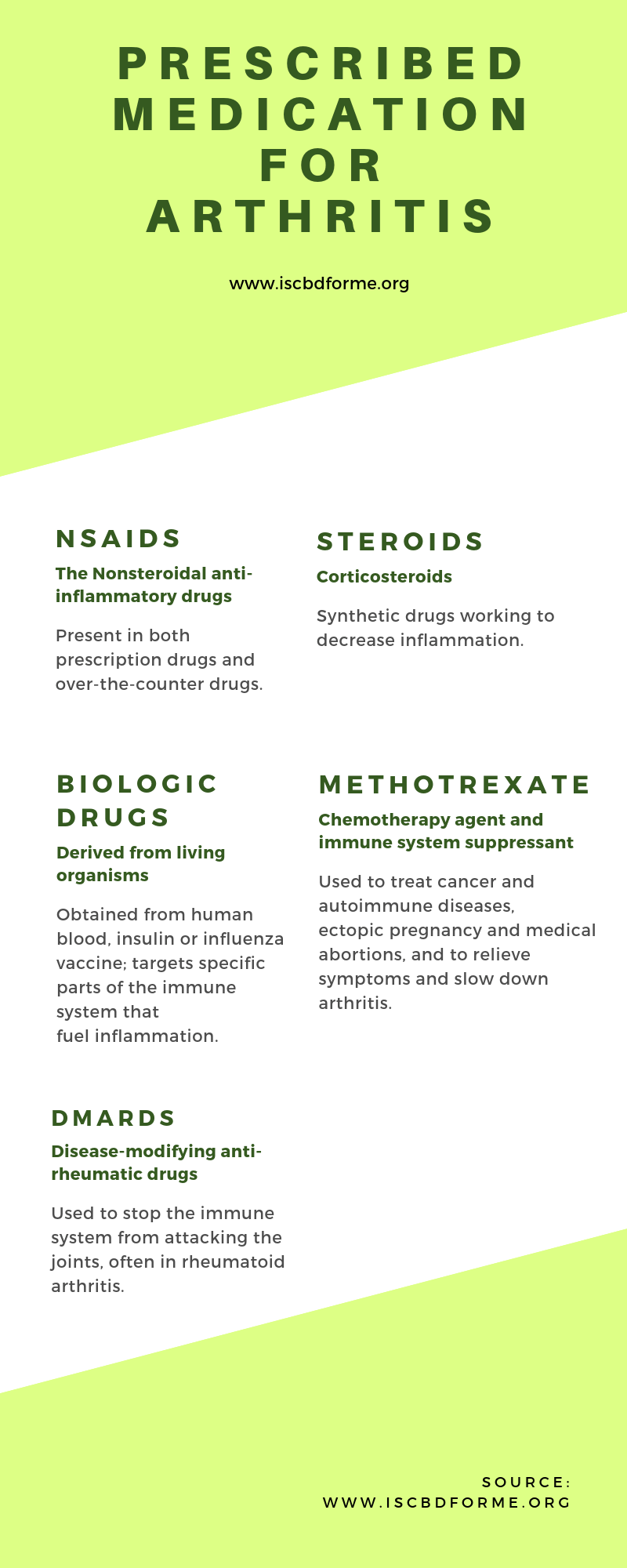Lately, CBD and arthritis seem to go hand in hand. Arthritis is a term meaning any disorder that affects joints. Symptoms generally include joint pain and stiffness. Other symptoms may include redness, warmth, swelling, and a decrease in the range of motion of the affected joints. In some types, other organs are also affected. Onset can be gradual or sudden.
There are more than 100 types of arthritis, each with different causes and treatments. However, the two most common are osteoarthritis and rheumatoid arthritis. Here we will discuss these, their current treatment and side effects, new research, and how CBD may aid with arthritis.
Osteoarthritis is the degeneration of joint cartilage and the underlying bone, most common from middle age onward. It causes pain and stiffness, especially in the hip, knee, and thumb joints. This is the type my husband has, especially in his thumbs. Anything involving the thumbs, such as phone texting, for example, can cause him excruciating pain. He takes CBD oil as a treatment to alleviate his pain.
Rheumatoid Arthritis is a chronic progressive disease causing inflammation in the joints and resulting in painful deformity and immobility, especially in the fingers, wrists, feet, and ankles. This is the type my mother-in-law has, especially in her fingers which are very painful.

Who has Arthritis?
Osteoarthritis is the most common joint disorder in the United States affecting approximately 27 million Americans and approximately 10% of Canadians aged 15 or older, it is about twice as common in women than in men.
Ways to alleviate the pain of osteoarthritis include exercise, weight loss, heat and cold, over-the-counter pain creams, Capsaicin, medication, and surgery.
Rheumatoid arthritis is the most common type of autoimmune arthritis. Ways to help are seeking early treatment for long-term results such as reduction of pain, swelling, and damage to the joints, regular exercise, and getting proper treatment from a rheumatologist.
Rheumatoid arthritis is not discriminatory. Famous actresses, Kathleen Turner and Tatum O’Neal, both suffer from it. The Arthritis Foundation estimates that about 1.5 million people in the United States have rheumatoid arthritis and osteoarthritis, and more common in women than men.
I’ve got to get ahead of it,” she says. “I’ve got to! I have a young spirit and want to be able to do anything in the world that I want to do. I want a long, healthy life. ~Tatum O’Neal
In addition to these two forms of arthritis, Fibromyalgia and gout are also quite common and considered a form of arthritis. Fibromyalgia is widespread pain and comes with a whole spectrum of other symptoms such as fatigue, inability to concentrate, mood, and sleep issues.
Gout is a form of inflammatory arthritis; uric acid crystals are the problem and can cause painful joint inflammation.
Are Current Prescribed Drugs Effective?
Let’s look at the most common drugs and their side effects.
NSAIDs (Nonsteroidal anti-inflammatory drugs), can be present in both prescription drugs such as Celebrex or oxaprozin and over-the-counter drugs like ibuprofen or aspirin.
Side Effects: heartburn and belching, bleeding ulcers, bruising, dizziness, kidney problems, allergy problems, dry mouth, risk of heart attacks, and high blood pressure.
Corticosteroids (steroids) are synthetic drugs that work by decreasing inflammation.
Side Effects: high blood pressure, eye problems such as cataracts or glaucoma, bruising, sleep issues, acne, blurred vision, increased appetite, high blood sugar, mood swings, and water retention.
Methotrexate, formerly known as amethopterin, is a chemotherapy agent and immune system suppressant. It treats cancer, autoimmune diseases, ectopic pregnancy, and medical abortions. It relieves symptoms and slows down arthritis; we inject it or take it orally.
Side Effects: nausea, headaches, and fatigue, with the most serious side effect being liver damage.
Biologic Drugs (derived from living organisms) come from humans or animals, such as in human blood, insulin, or influenza vaccine. They are genetically engineered proteins that target specific parts of the immune system that fuel inflammation.
Side Effects: infection is the main one, reactivating Hepatitis B, allergy reactions (such as itchiness, shortness of breath, itchy eyes and lips), vision problems, numbness, cardiac reactions, and joint and body pain.
DMARDs are Disease-modifying anti-rheumatic (Trexall, Rasuvo, Plaquenil) drugs that stop the immune system from attacking the joints, often in rheumatoid arthritis.
Side Effects: Some common ones are upset stomach, liver issues, and problems with your blood as they can affect the immune system and cause anemia resulting in tiredness or raising the risk of infection.

Using CBD for Arthritis
Now that you know a bit about arthritis and pharmaceutical drugs and their side effects, let’s look at CBD. If you are anything like me, we cringe when we read about the side effects of drugs. I refuse the drugs my family doctor recommends because of the scary side effects associated with them.
Past studies suggest that CBD oil could play a significant role in the management of arthritis. They believe it affects receptors in the brain and immune system and may reduce inflammation and pain.
A study done in 2016 on rats with arthritis shows reduced inflammation and overall pain in affected joints with no side effects, but again we need more research on humans.
Here is an excellent video with Dr. Jason McDougall, sharing his expertise and knowledge. Dr. McDougall is the Professor of Pharmacology and Anaesthesia, Dalhousie University Chair, Scientific Advisory Committee, The Arthritis Society. While he doesn’t come right out and say that CBD helps arthritis, what he says is that it has been ‘shown’ to be effective in controlling pain and inflammation. He also says the Medical Cannabis prescribed by doctors has shown evidence that it can be effective in alleviating arthritis pain, inflammation, and fatigue.
In 2018, due to the generosity and vision of the Arthritis Society, Dr. Jason McDougall and Melissa O’Brien (Doctor of Philosophy – Ph.D., Pharmacology, Dalhousie) felt that while most of today’s pain medications target inflammation, some arthritic pain stems from nerve damage and this is especially true for women.
This study enables them to figure out why current painkillers may not function well for females – who have more arthritis than males – and may lead to a fresh, more focused therapy for pain.
Other studies have shown that most people tolerate CBD oils well, but there are a few who may experience tiredness, sleeplessness, irritability, and nausea.
CBD oil:
-
has no nasty side effects
- is non-psychoactive
- does not alter one’s functionality
Hundreds of people are using CBD oils for arthritis and find they get the best results when they combine it with exercise, changes in diet, and pharmaceutical drugs, either prescribed or over the counter.
It is important to note here that CBD can interfere with certain drugs.
UPDATE OCTOBER 1, 2019
The Arthritis Foundation is the first major health organization to release guidelines for the use of CBD. While they feel more scientific evidence is needed, it asserts that cannabis may help arthritis-related symptoms.
Some of their recommendations are:
- Go low and slow
- Buy from reputable companies
- Check with a doctor before starting
The Arthritis Foundation cautions against inhaling because of the spike in vape-related illnesses and deaths and that CBD should NOT replace any doctor-prescribed medication already in use.
View the full video here.
Author’s Note: This post was first published in April 2018 and has been modified and updated with new information.
Mary Ann shares her passion and personal experience with CBD and medical cannabis as well as the experiences of others. Do visit regularly to find out the ins and outs of CBD and medical marijuana products. If you are passionate about something and would love to share it on your own website, then click here to get started.
